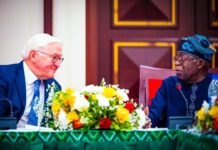Sri Lankan security forces found 15 bodies, including six children, early Saturday after militants linked to the Easter bombings opened fire and set off explosives during a raid on their house in the country’s east, police said.
The gunbattle began Friday night after police tipped off soldiers to a suspected safe house near the town of Sammanthurai, where authorities said the militants detonated three explosions and opened fire.
At least three others were wounded in the attack, said police spokesman Ruwan Gunasekara.
He said that some of the dead likely were militants who blew themselves up in suicide bombings. Earlier, the military said at least one civilian had been killed in the attack.
Raids and police curfews shut down areas of eastern Sri Lanka as Catholic leaders canceled Sunday Masses indefinitely.
Officials also urged Muslims to stay home for prayers in an extraordinary call by the clergy to curtail worship as fear of more attacks plagued the island nation.
Maj. Gen. Aruna Jayasekara, the local military commander, said soldiers and police waited until daylight Saturday to carry out further raids in Eastern Province given houses being built so close together.
Meanwhile, the military said security forces had recovered explosives, detonators, “suicide kits,” military uniforms and Islamic State group flags in the ongoing raids.
In the same area, police spokesman Ruwan Gunasekara said officers acting on information from intelligence officials found 150 sticks of blasting gelatin and 100,000 small metal balls, as well as a van and clothing suspected to be used by those involved in the Easter attack.
Suicide bomb vests often are packed with such balls to increase the shrapnel in the explosion, making them even deadlier.
Officials from the police to the prime minister say militants remain on the loose and have access to explosives. That has led to increased security at shrines, churches, temples and mosques across the multiethnic country of 21 million off the southern coast of India.
Cardinal Malcolm Ranjith told journalists Friday that church officials had seen a leaked security document describing Roman Catholic churches and other denominations as a major target. Ranjith, who is the archbishop of Colombo, asked the faithful across Sri Lanka to stay home for their own safety.
“We don’t want repetitions,” Ranjith said.



